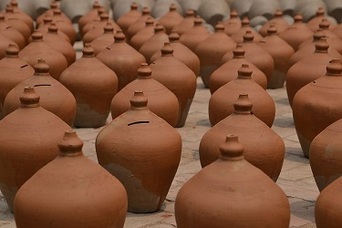 Are you familiar with the story in the Gospel of John chapter 4 about Jesus’ meeting with the woman at the well? I’ve been taught it since I was in Sunday School. You wouldn’t think there’d be anything new for me to glean from it, would you? But there is.
Are you familiar with the story in the Gospel of John chapter 4 about Jesus’ meeting with the woman at the well? I’ve been taught it since I was in Sunday School. You wouldn’t think there’d be anything new for me to glean from it, would you? But there is.
We studied the passage this week in the wonderful Bible study I attend. There was a discussion question about an issue that I’d never considered before. Perhaps I’d better set the stage a bit, just in case you’re not familiar with the narrative:
Jesus is going around teaching and performing miracles with His disciples and now decides to return to Galilee, cutting through Samaria on the way. He’s tired from the journey and sits down on the edge of the well at a town called Sychar. It’s noon, a time when people typically are inside resting. But here comes this woman, bringing her water jar to the well at the hottest part of the day. Why? Because she’s the town outcast, and she doesn’t want to be around the other women. Jesus asks her for a drink, which puzzles her greatly: “’You are a Jew and I am a Samaritan woman. How can you ask me for a drink?’ (For Jews do not associate with Samaritans.)”
Well, the conversation goes on from there, with Jesus gradually revealing that He is the Messiah that she has heard will come. And here’s where the empty water jar comes in: we’re told that she gets so excited about the news of who Jesus is that “then, leaving her water jar, the woman went back to the town and said to the people, ‘Come, see a man who told me everything I ever did. Could this be the Messiah?'” It’s pretty clear, if you follow the conversation preceding her action, that she never filled her jar. She suddenly had something much more important to do.
In all the times I’ve read and heard this story I never noticed that telling detail: the empty water jar left sitting beside the well. Our teaching leader (one of my three main sources for cadging, remember?) said that she sees that jar as “coping or compensatory behavior”–in other words, whatever we do to try to cover up our problems, our–let’s call it by the biblical name–sins, instead of dealing with them. In her meeting with Jesus the woman is brought up short. He asks her to go call her husband; she says, “I have no husband.” “You are right when you say you have no husband,” He says. “The fact is, you have had five husbands, and the man you now have is not your husband. What you have just said is quite true.” Whoa! Now we know why she doesn’t go to the well with the other women–they gossip about her.
So what happens? Instead of her hiding from what Jesus has told her, she now celebrates it because her focus has shifted: “He told me everything I ever did.” Facing her sin, accepting Jesus as the source of Living Water, has freed her from herself.
I’ll bet she filled her water jar that evening along with all the other women, and their conversation centered on the wonderful events of the day. And what did she do with her life after that? We don’t know. She never appears in the pages of Scripture again. Just that one compelling little scene.
So I’ve been thinking about how this story applies in my own life: What’s my empty water jar? What’s my coping mechanism to cover up my own sins and shortcoming? I hope to be sharing some further thoughts about this question in the days ahead.
Note: All Scripture quotations are from the NIV.